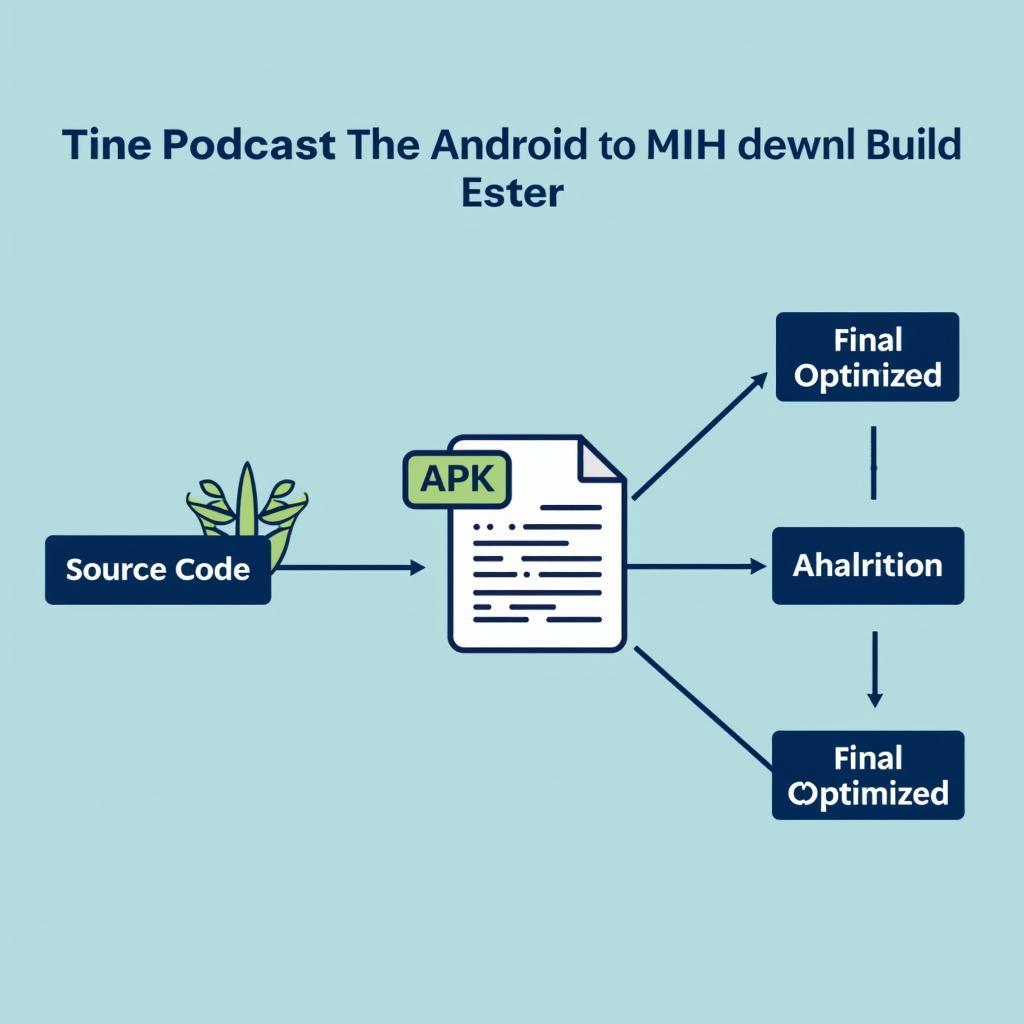Building Android apps involves numerous components, and understanding the “build file APK” is crucial for developers. This guide dives deep into the intricacies of this file, especially the significance of encoding, and provides a comprehensive understanding of its role in Android app development.
Understanding the Android Build Process
Before delving into the specifics of the “top encode build file APK,” it’s essential to grasp the overall Android build process. In essence, this process transforms your written code and resources into a functional Android application package (APK) ready for distribution and installation on Android devices.
The build process involves several key steps:
- Compilation: Your source code, written in languages like Java or Kotlin, is compiled into bytecode.
- Resource Compilation: Non-code resources such as images, layouts, and strings are compiled and compressed.
- Manifest Merging: The Android Manifest file, containing essential app information, is merged with compiled resources.
- APK Generation: All compiled components are packaged into an APK file.
- Signing: The APK is digitally signed to ensure authenticity and prevent tampering.
- Optimization: The APK undergoes optimization for size and performance.
 Android App Build Process Diagram
Android App Build Process Diagram
Decoding the “Top Encode Build File APK”
The term “top encode build file APK” isn’t a standard term in Android development. However, it likely refers to the encoding of the APK file itself and its relationship to the build process.
Here’s a breakdown:
- Encoding: Encoding refers to the process of converting data into a specific format for efficient storage or transmission. In the context of APK files, the most common encoding is ZIP.
- Build File: This likely alludes to the build configuration files that dictate how the APK is generated. In Android development, these are typically Gradle build scripts.
- APK: The final output of the Android build process, the APK (Android Package Kit) is a single file containing all the elements necessary to run your app.
Essentially, the phrase points towards understanding how encoding and the build process influence the final APK file.
The Importance of Encoding in APK Files
Encoding plays a vital role in the creation of APK files, directly impacting several crucial aspects:
- Compression: ZIP encoding compresses the contents of an APK, reducing its overall size. This is essential for efficient storage and download, especially considering the limitations of mobile data and device storage.
- Structure: Encoding provides a structured format for organizing the various components within an APK, including code, resources, and metadata. This organized structure allows Android devices to easily unpack and access the necessary files.
- Integrity: Encoding helps maintain the integrity of the APK by protecting its contents from corruption. The compression and packaging process includes checks to ensure that all files are correctly included and undamaged.
Common Encoding Issues and Solutions
While encoding is crucial, it can sometimes lead to issues during the build process. Here are a few common problems and their solutions:
- Character Encoding Problems: Incorrect character encoding can lead to display issues, especially with special characters or different languages. Ensure your project uses UTF-8 encoding consistently.
- Resource Compression Issues: Overly aggressive compression can sometimes corrupt resources like images. Adjust compression settings in your build configuration if needed.
- APK Signature Verification Errors: Issues during the signing process, potentially related to encoding errors, can prevent installation. Double-check your signing configuration and ensure the APK hasn’t been modified after signing.
Best Practices for Android APK Encoding
To ensure a smooth build process and a well-structured APK, follow these best practices:
- Consistent Encoding: Use UTF-8 encoding throughout your project for text files, code, and resources.
- Optimize Resource Compression: Balance compression levels to reduce APK size without compromising resource quality.
- Verify APK Integrity: After building, verify the APK’s signature and integrity using tools provided by the Android SDK.
- Stay Updated: Keep your build tools and SDK up-to-date to benefit from the latest encoding and compression improvements.
Conclusion
Understanding the nuances of “Android Top Encode Build File Apk” is more about recognizing the intertwined relationship between encoding and the build process. By comprehending the importance of encoding and following best practices, developers can ensure the creation of efficient, reliable, and easily distributable Android applications.
For further exploration into Android app development and related topics, consider diving deeper into apk developer resources.